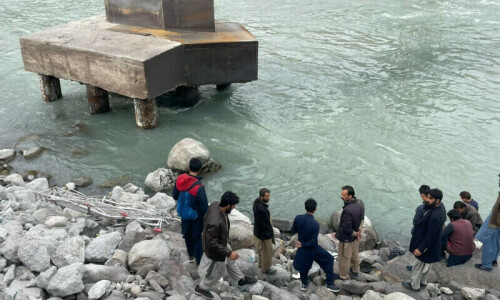PESHAWAR, Nov 19: The NWFP government is seeking 5.89 cents as per unit tariff for the Malakand-III power project instead of the 4.70 cents determined under the Federal Hydel Policy-1995, according to officials.
The provincial government has cited as its reason for their demand a recent decision of the Economic Coordination Committee (ECC) of the federal cabinet through which three hydel power projects were allowed a 25-per cent raise in their tariff.
Officials told Dawn that the Frontier government had approached the National Electric Power Regulatory Authority (Nepra) for availing new tariff for the Malakand-III hydro-power project, which is going to start commercial power generation by the end of the year.
Nepra is currently hearing the petition of the Frontier government for determining the average upfront tariff for the same project. Wapda, being purchaser of the power to be generated from the project, earlier had offered a tariff of 3.20 cents per unit, whereas the provincial government had demanded 4.70 cents per unit tariff that was mentioned in the Federal Hydel Policy-1995.
“Wapda has agreed to give us 4.70 cents per unit tariff as per the Federal Hydel Policy 1995, but now since the tariff of three other projects of a similar nature have been revised upwards, we are making efforts for getting the same for the Malakand-III hydro-power project,” an official explained.
The government had increased power tariff by 25 per cent to 5.89 cents per unit for three hydel power projects of 300 megawatts capacity in line with the ECC decision, taken on Oct 31.
The projects benefiting from the decision are the Laraib Energy Limited for its 84-MW New Bong Escape Project situated downstream of Mangla Dam, 132-MW Rajdhani power project in Azad Kashmir and 84-MW Matiltan Project in the NWFP. All three projects are being set up under the 1995 Hydel Power Policy.
The official explained that tariff under the 1995 policy was based on prices and cost assumptions of the time which had not been revised to cater for the escalation since then, making most of the hydel-power sector projects economically not viable.
He said the price structure under the 1995 policy is hindering the prospects of attracting investments to the power-generation sector. He added that setting up a hydro-power station in the plains of Punjab should be seen as quite different from setting one in the hilly and remote areas of the NWFP, adding that the tariff should be determined on a project-to-project basis.












































Dear visitor, the comments section is undergoing an overhaul and will return soon.